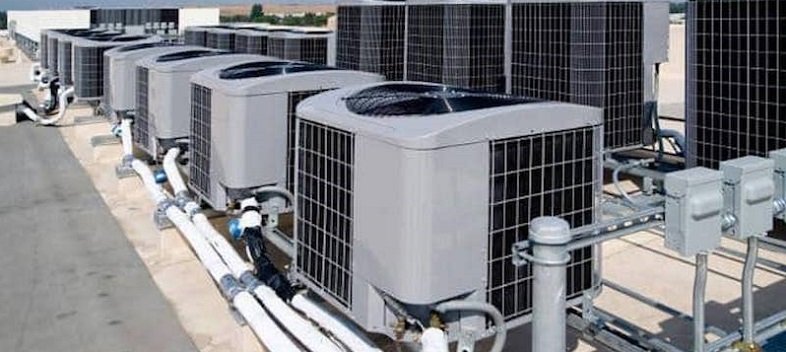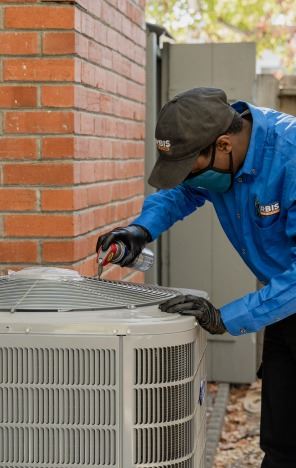Evaluating Brands for heat pump installation ooltewah tn
Evaluating Brands for heat pump installation ooltewah tn
Blog Article
Picking In Between a Warmth Pump and Heating System: Trick Factors To Consider for Your Cooling And Heating Requirements
When examining heating options for heating and cooling needs, the choice between a heatpump and a furnace can be intricate. Each system uses unique advantages customized to certain climates and power effectiveness goals. Understanding these distinctions is crucial for making an enlightened choice. Trick aspects such as installation prices and environmental impact even more make complex the selection process. Which option truly straightens with one's comfort and sustainability choices? The complying with areas will discover these considerations thoroughly.
Comprehending Heat Pumps: Exactly How They Function and Their Benefits
While several house owners consider different home heating choices, recognizing exactly how heatpump function and their advantages can greatly influence their choice. Heatpump operate by moving warm rather than producing it. In the winter months, they extract warm from the outdoors air or ground and transfer it inside your home, while in the summer season, they reverse this process, cooling the home by getting rid of warmth outside. This dual performance makes them functional for year-round climate control.One of the main advantages of warmth pumps is their energy effectiveness. They utilize considerably much less electricity compared to traditional heater, possibly resulting in reduced utility costs (heat pump replacement ooltewah tn). Additionally, heatpump have a smaller carbon impact, making them an eco-friendly selection. They likewise need much less upkeep than standard systems, contributing to long-term cost savings. In general, comprehending the auto mechanics and advantages of warm pumps can assist property owners make notified decisions regarding their heating and cooling needs
Discovering Heaters: Kinds, Procedure, and Benefits
Heaters come in various kinds, consisting of gas, electrical, and oil designs, each with distinct functional systems. Understanding these differences is important, as they impact efficiency and heating efficiency. Furthermore, heating systems provide various benefits, such as regular warm output and reliability in cooler climates.
Kinds of Heaters
Heater can vary considerably in layout and operation, with furnaces being a prominent choice amongst homeowners. There are a number of sorts of furnaces, each making use of different gas resources and innovations. Gas furnaces prevail, leveraging gas to produce warm efficiently. Electric heaters, on the other hand, utilize electrical resistance to generate heat, frequently preferred for their simple installation. Oil heating systems, while less typical, work in areas with minimal gas access (ductless mini splits). In addition, condensing furnaces make the most of power efficiency by reusing and catching exhaust gases. Each kind operates with a system of warmth exchangers and ductwork to distribute warm air throughout a home. Recognizing the distinctions between these heater types is vital for educated heating and cooling choices
Benefits of Heaters
For property owners seeking dependable heat throughout cool months, the advantages of heating systems are substantial. Furnaces supply regular heating, guaranteeing also temperature levels throughout the home. They are particularly effective in extreme cold, commonly outperforming heatpump in icy problems. Various types, including gas, electric, and oil furnaces, provide versatility to meet diverse needs and preferences.Furnaces also have a tendency to have lower preliminary setup expenses compared to heatpump, making them a much more easily accessible choice for lots of. Their durable style adds to a longer life expectancy, with numerous units lasting over 15 years with proper maintenance. Additionally, modern heaters are often furnished with sophisticated innovation for boosted performance, which can bring about lowered power expenses. In general, furnaces remain a dependable choice for reliable home heating.

Energy Effectiveness: Contrasting Heat Pumps and Furnaces
When comparing power performance between heatpump and heaters, the Seasonal Energy Effectiveness Proportion (SEER) plays an essential function in figuring out efficiency. Additionally, an operational expense evaluation reveals the long-lasting monetary ramifications of each system. Recognizing these variables can direct house owners in making informed choices regarding their heating services.
Seasonal Power Effectiveness Proportion
Energy efficiency plays a necessary duty in the decision-making process in between heatpump and heaters, particularly when considering the Seasonal Energy Performance Proportion (SEER) This statistics actions the cooling efficiency of heatpump over a whole air conditioning period, offering a standard means to examine efficiency. Greater SEER rankings show higher energy efficiency, converting to lower power consumption and minimized utility expenses. On the other hand, heating systems are normally examined utilizing the Annual Fuel Usage Effectiveness (AFUE) ranking, which mirrors home heating efficiency. When comparing these 2 systems, homeowners must prioritize SEER rankings for warmth pumps, as they directly impact general energy cost savings and environmental sustainability. A comprehensive understanding of SEER can notably influence the long-term fulfillment and cost-effectiveness of the chosen cooling and heating solution.
Functional Price Analysis
Comprehending the functional prices related to warmth pumps and heating systems is essential for home owners reviewing their options. Heatpump usually supply higher power effectiveness, transforming electrical energy into heat with very little waste. This causes reduced regular monthly energy costs, especially in moderate environments. On the other hand, traditional heating systems, specifically gas designs, might have lower in advance expenses yet can sustain higher operational expenditures gradually as a result of fuel prices and performance ratings.Moreover, heatpump can work as both home heating and cooling down systems, possibly decreasing the need for separate cooling and heating units. While preliminary financial investments for warmth pumps may be greater, their long-lasting cost savings in energy effectiveness can make them a more economical choice for several homes. Mindful evaluation of neighborhood power prices is necessary to figure out the ideal option.
Installment Prices: What to Expect for each and every Home Heating System
Installation costs for furnace can vary considerably in between heatpump and furnaces, affecting house owners' choices. Heat pumps typically have greater in advance installation expenses, typically ranging from $3,500 to $8,000, depending on the unit dimension and complexity of installment. This includes the outside system, indoor handling system, and necessary ductwork adjustments. On the other hand, furnaces have a tendency to have reduced first prices, balancing between $2,500 and $6,000, which can be appealing for budget-conscious home owners. However, installment costs can boost if substantial ductwork is required.Moreover, the option of gas kind for heaters-- gas, lp, or electrical-- can likewise affect setup reference expenses. While heat pumps provide power performance, their initial investment may hinder some customers. Ultimately, evaluating installment expenses alongside long-lasting financial savings and performance will certainly aid homeowners in making informed decisions concerning their furnace.
Climate Considerations: Which System Does Much Better in Your Area
How do environment problems influence the performance of heater? The performance of heat pumps and heaters can differ significantly relying on the neighborhood climate. In modest climates, heatpump stand out by effectively transferring heat from the outside air, making them an energy-saving choice. Their efficiency reduces in exceptionally chilly temperatures, where they may have a hard time to extract enough warm. Conversely, furnaces, specifically gas designs, give regular and dependable warm no matter outside conditions, making them more suitable in chillier regions.In locations that experience milder winters, heat pumps can operate effectively year-round, offering both cooling and heating. On the other hand, regions with harsh winter seasons frequently gain from the toughness of heaters. Eventually, comprehending the local environment is crucial when choosing between a warmth pump and a heater, as it straight impacts their functional efficiency and overall efficiency.
Maintenance Needs: Long-Term Take Care Of Heat Pumps vs. Furnaces
While both warm pumps and heating systems need routine maintenance to ensure peak efficiency, their specific requirements and care routines vary substantially. Furnaces typically require less frequent focus, with annual evaluations sufficing to look for gas leaks, tidy filters, and evaluate general capability. Their simpler layout commonly permits straightforward repairs.In comparison, warmth pumps necessitate biannual upkeep as a result of their double role in home heating and air conditioning. This consists of cleaning coils, checking refrigerant degrees, and making sure that both the indoor and exterior devices operate at their ideal. Additionally, heat pump maintenance usually includes more elaborate elements, making specialist servicing essential.Neglecting upkeep can lead to reduced efficiency and boosted power expenses for both systems. Inevitably, property owners must take into consideration these long-lasting care needs when selecting between a heatpump and a heater, as aggressive maintenance can extend the life-span and efficiency of either system considerably.
Environmental Effect: Choosing a Sustainable Home Heating Choice
The ecological impact of heater is an important analysis for property owners looking for sustainable options. Heatpump are normally more energy-efficient than traditional furnaces, as they move warm as opposed to create it, greatly minimizing carbon exhausts. By utilizing renewable resource resources, such as geothermal or air-source heatpump, house owners can additionally reduce their ecological footprint.On the various other hand, gas furnaces produce greenhouse gases and add to air contamination, though they typically supply higher heat outcome. Nevertheless, advancements in technology have actually resulted in the development of high-efficiency heating systems that minimize emissions.Ultimately, picking a furnace involves weighing performance against environmental influence. Homeowners are encouraged to review regional energy sources and rewards for sustainable systems, ensuring a selection that lines up with both personal comfort and environmental duty. The choice impacts not only prompt comfort but additionally long-lasting sustainability and ecological health and wellness.
Regularly Asked Questions
How Much Time Do Heat Pumps and Furnaces Usually Last?
The life-span of heatpump typically ranges from 15 to two decades, while heating systems can last in between 15 to three decades. Normal upkeep substantially impacts their longevity and effectiveness in supplying home heating remedies.
Can I Make Use Of a Heatpump in Exceptionally Cold Climates?
Heatpump can run in incredibly chilly environments, but their performance diminishes as temperature levels decrease. In such conditions, supplementary heating resources may be essential to keep comfy interior temperature levels and assure peak efficiency.

What Is the Sound Degree of Warmth Pumps Versus Furnaces?
The noise levels of heatpump and furnaces vary substantially. Generally, heat pumps operate more silently than standard heating systems, making them preferable for those conscious sound, while heating systems might create louder functional noises throughout home heating cycles.
Are Warm Pumps Suitable for Both Heating & Cooling?
Heatpump are undoubtedly ideal for both home heating and air conditioning (ductless mini splits). They function by moving warm, supplying reliable temperature control year-round, making them a flexible selection for homeowners looking for an all-in-one a/c option
What Size Heating Unit Do I Required for My Home?
Determining the suitable size heating unit for a home requires reviewing elements such as square video footage, insulation high quality, local environment, and the home's layout. Consulting a specialist can ensure an accurate assessment and optimal additional info convenience. Warm pumps normally provide look what i found higher energy performance, transforming electrical power into heat with marginal waste. In moderate climates, warm pumps excel by successfully transferring warmth from the outside air, making them an energy-saving alternative. Alternatively, heaters, especially gas designs, provide consistent and trustworthy warm regardless of outside problems, making them better in colder regions.In locations that experience milder wintertimes, warmth pumps can operate effectively year-round, supplying both home heating and cooling. Warm pumps are generally more energy-efficient than typical heaters, as they transfer warm instead than create it, significantly reducing carbon emissions. By using sustainable power resources, such as air-source or geothermal warmth pumps, house owners can even more decrease their environmental footprint.On the various other hand, all-natural gas heaters emit greenhouse gases and contribute to air pollution, though they usually supply higher warm output.
Report this page